Business Law Essay: Legal System, Government, Business, and Disputes
VerifiedAdded on 2021/02/19
|9
|2679
|57
Essay
AI Summary
This essay provides a comprehensive overview of business law within the UK legal system. It begins by outlining the sources of law, including primary sources like case law and legislation, and secondary sources such as legal encyclopedias and textbooks. The essay then explores the role of government in shaping the legal landscape, categorizing its functions into executive, legislative, and judicial roles. Furthermore, it delves into the application of common and statutory law, highlighting the distinctions between them. The essay proceeds to discuss the impact of various laws on business operations, with a focus on company law, employment law, and contract law, providing examples of how these laws affect real-world scenarios. Finally, the essay examines legal solutions for dispute resolution, such as arbitration and mediation, offering insights into their effectiveness. The essay concludes by emphasizing the importance of legal advice and the various sources through which it can be obtained.

Business Law
Paraphrase This Document
Need a fresh take? Get an instant paraphrase of this document with our AI Paraphraser
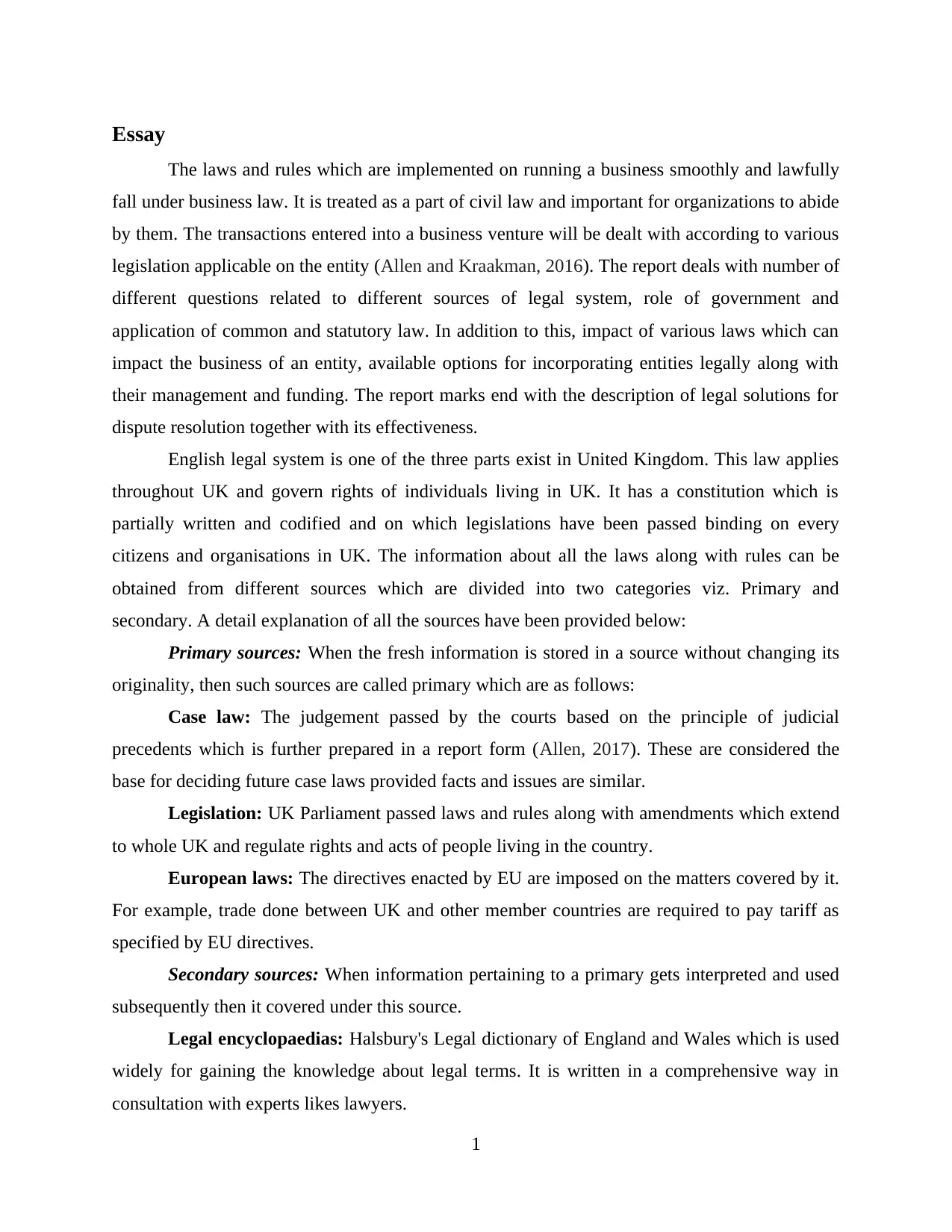
Essay
The laws and rules which are implemented on running a business smoothly and lawfully
fall under business law. It is treated as a part of civil law and important for organizations to abide
by them. The transactions entered into a business venture will be dealt with according to various
legislation applicable on the entity (Allen and Kraakman, 2016). The report deals with number of
different questions related to different sources of legal system, role of government and
application of common and statutory law. In addition to this, impact of various laws which can
impact the business of an entity, available options for incorporating entities legally along with
their management and funding. The report marks end with the description of legal solutions for
dispute resolution together with its effectiveness.
English legal system is one of the three parts exist in United Kingdom. This law applies
throughout UK and govern rights of individuals living in UK. It has a constitution which is
partially written and codified and on which legislations have been passed binding on every
citizens and organisations in UK. The information about all the laws along with rules can be
obtained from different sources which are divided into two categories viz. Primary and
secondary. A detail explanation of all the sources have been provided below:
Primary sources: When the fresh information is stored in a source without changing its
originality, then such sources are called primary which are as follows:
Case law: The judgement passed by the courts based on the principle of judicial
precedents which is further prepared in a report form (Allen, 2017). These are considered the
base for deciding future case laws provided facts and issues are similar.
Legislation: UK Parliament passed laws and rules along with amendments which extend
to whole UK and regulate rights and acts of people living in the country.
European laws: The directives enacted by EU are imposed on the matters covered by it.
For example, trade done between UK and other member countries are required to pay tariff as
specified by EU directives.
Secondary sources: When information pertaining to a primary gets interpreted and used
subsequently then it covered under this source.
Legal encyclopaedias: Halsbury's Legal dictionary of England and Wales which is used
widely for gaining the knowledge about legal terms. It is written in a comprehensive way in
consultation with experts likes lawyers.
1
The laws and rules which are implemented on running a business smoothly and lawfully
fall under business law. It is treated as a part of civil law and important for organizations to abide
by them. The transactions entered into a business venture will be dealt with according to various
legislation applicable on the entity (Allen and Kraakman, 2016). The report deals with number of
different questions related to different sources of legal system, role of government and
application of common and statutory law. In addition to this, impact of various laws which can
impact the business of an entity, available options for incorporating entities legally along with
their management and funding. The report marks end with the description of legal solutions for
dispute resolution together with its effectiveness.
English legal system is one of the three parts exist in United Kingdom. This law applies
throughout UK and govern rights of individuals living in UK. It has a constitution which is
partially written and codified and on which legislations have been passed binding on every
citizens and organisations in UK. The information about all the laws along with rules can be
obtained from different sources which are divided into two categories viz. Primary and
secondary. A detail explanation of all the sources have been provided below:
Primary sources: When the fresh information is stored in a source without changing its
originality, then such sources are called primary which are as follows:
Case law: The judgement passed by the courts based on the principle of judicial
precedents which is further prepared in a report form (Allen, 2017). These are considered the
base for deciding future case laws provided facts and issues are similar.
Legislation: UK Parliament passed laws and rules along with amendments which extend
to whole UK and regulate rights and acts of people living in the country.
European laws: The directives enacted by EU are imposed on the matters covered by it.
For example, trade done between UK and other member countries are required to pay tariff as
specified by EU directives.
Secondary sources: When information pertaining to a primary gets interpreted and used
subsequently then it covered under this source.
Legal encyclopaedias: Halsbury's Legal dictionary of England and Wales which is used
widely for gaining the knowledge about legal terms. It is written in a comprehensive way in
consultation with experts likes lawyers.
1
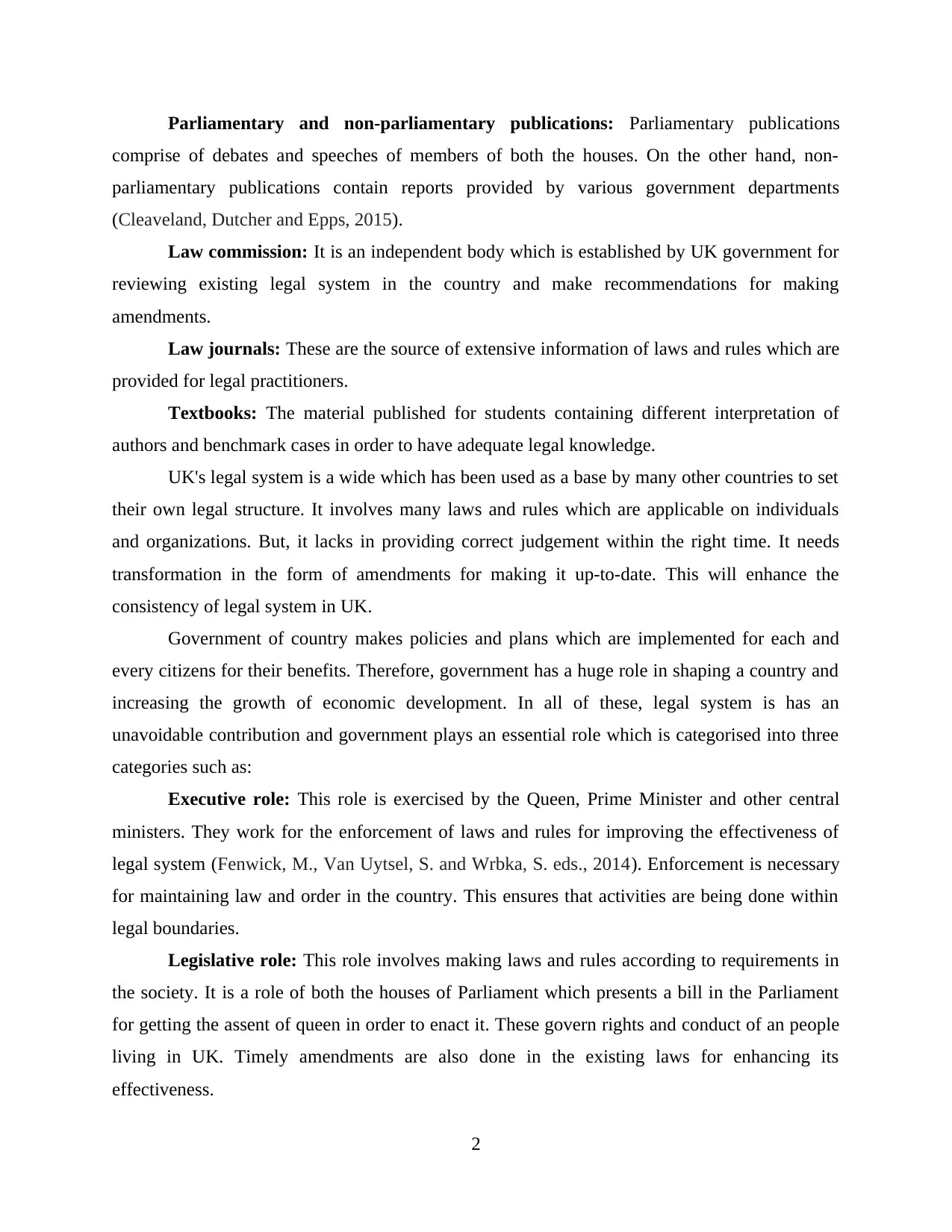
Parliamentary and non-parliamentary publications: Parliamentary publications
comprise of debates and speeches of members of both the houses. On the other hand, non-
parliamentary publications contain reports provided by various government departments
(Cleaveland, Dutcher and Epps, 2015).
Law commission: It is an independent body which is established by UK government for
reviewing existing legal system in the country and make recommendations for making
amendments.
Law journals: These are the source of extensive information of laws and rules which are
provided for legal practitioners.
Textbooks: The material published for students containing different interpretation of
authors and benchmark cases in order to have adequate legal knowledge.
UK's legal system is a wide which has been used as a base by many other countries to set
their own legal structure. It involves many laws and rules which are applicable on individuals
and organizations. But, it lacks in providing correct judgement within the right time. It needs
transformation in the form of amendments for making it up-to-date. This will enhance the
consistency of legal system in UK.
Government of country makes policies and plans which are implemented for each and
every citizens for their benefits. Therefore, government has a huge role in shaping a country and
increasing the growth of economic development. In all of these, legal system is has an
unavoidable contribution and government plays an essential role which is categorised into three
categories such as:
Executive role: This role is exercised by the Queen, Prime Minister and other central
ministers. They work for the enforcement of laws and rules for improving the effectiveness of
legal system (Fenwick, M., Van Uytsel, S. and Wrbka, S. eds., 2014). Enforcement is necessary
for maintaining law and order in the country. This ensures that activities are being done within
legal boundaries.
Legislative role: This role involves making laws and rules according to requirements in
the society. It is a role of both the houses of Parliament which presents a bill in the Parliament
for getting the assent of queen in order to enact it. These govern rights and conduct of an people
living in UK. Timely amendments are also done in the existing laws for enhancing its
effectiveness.
2
comprise of debates and speeches of members of both the houses. On the other hand, non-
parliamentary publications contain reports provided by various government departments
(Cleaveland, Dutcher and Epps, 2015).
Law commission: It is an independent body which is established by UK government for
reviewing existing legal system in the country and make recommendations for making
amendments.
Law journals: These are the source of extensive information of laws and rules which are
provided for legal practitioners.
Textbooks: The material published for students containing different interpretation of
authors and benchmark cases in order to have adequate legal knowledge.
UK's legal system is a wide which has been used as a base by many other countries to set
their own legal structure. It involves many laws and rules which are applicable on individuals
and organizations. But, it lacks in providing correct judgement within the right time. It needs
transformation in the form of amendments for making it up-to-date. This will enhance the
consistency of legal system in UK.
Government of country makes policies and plans which are implemented for each and
every citizens for their benefits. Therefore, government has a huge role in shaping a country and
increasing the growth of economic development. In all of these, legal system is has an
unavoidable contribution and government plays an essential role which is categorised into three
categories such as:
Executive role: This role is exercised by the Queen, Prime Minister and other central
ministers. They work for the enforcement of laws and rules for improving the effectiveness of
legal system (Fenwick, M., Van Uytsel, S. and Wrbka, S. eds., 2014). Enforcement is necessary
for maintaining law and order in the country. This ensures that activities are being done within
legal boundaries.
Legislative role: This role involves making laws and rules according to requirements in
the society. It is a role of both the houses of Parliament which presents a bill in the Parliament
for getting the assent of queen in order to enact it. These govern rights and conduct of an people
living in UK. Timely amendments are also done in the existing laws for enhancing its
effectiveness.
2
⊘ This is a preview!⊘
Do you want full access?
Subscribe today to unlock all pages.

Trusted by 1+ million students worldwide
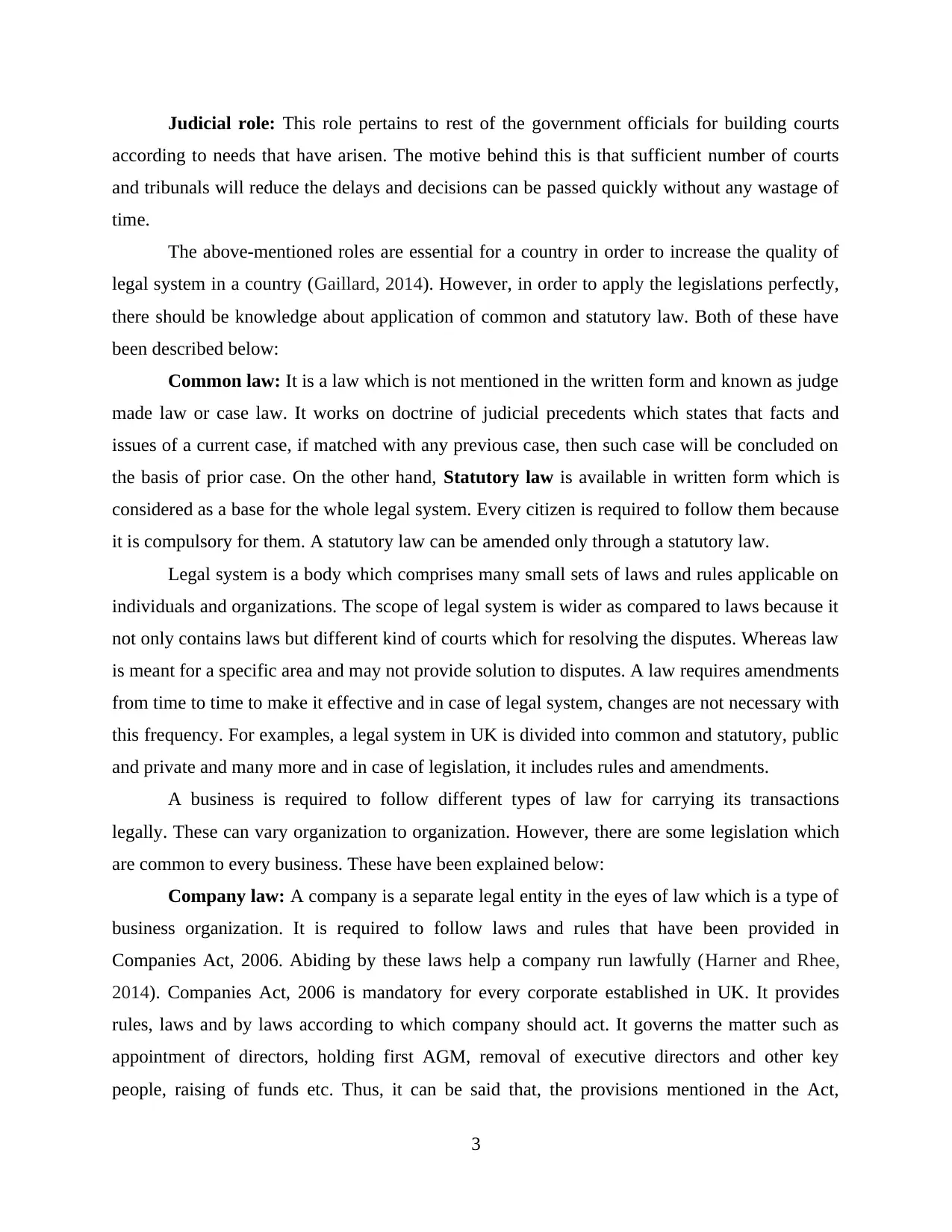
Judicial role: This role pertains to rest of the government officials for building courts
according to needs that have arisen. The motive behind this is that sufficient number of courts
and tribunals will reduce the delays and decisions can be passed quickly without any wastage of
time.
The above-mentioned roles are essential for a country in order to increase the quality of
legal system in a country (Gaillard, 2014). However, in order to apply the legislations perfectly,
there should be knowledge about application of common and statutory law. Both of these have
been described below:
Common law: It is a law which is not mentioned in the written form and known as judge
made law or case law. It works on doctrine of judicial precedents which states that facts and
issues of a current case, if matched with any previous case, then such case will be concluded on
the basis of prior case. On the other hand, Statutory law is available in written form which is
considered as a base for the whole legal system. Every citizen is required to follow them because
it is compulsory for them. A statutory law can be amended only through a statutory law.
Legal system is a body which comprises many small sets of laws and rules applicable on
individuals and organizations. The scope of legal system is wider as compared to laws because it
not only contains laws but different kind of courts which for resolving the disputes. Whereas law
is meant for a specific area and may not provide solution to disputes. A law requires amendments
from time to time to make it effective and in case of legal system, changes are not necessary with
this frequency. For examples, a legal system in UK is divided into common and statutory, public
and private and many more and in case of legislation, it includes rules and amendments.
A business is required to follow different types of law for carrying its transactions
legally. These can vary organization to organization. However, there are some legislation which
are common to every business. These have been explained below:
Company law: A company is a separate legal entity in the eyes of law which is a type of
business organization. It is required to follow laws and rules that have been provided in
Companies Act, 2006. Abiding by these laws help a company run lawfully (Harner and Rhee,
2014). Companies Act, 2006 is mandatory for every corporate established in UK. It provides
rules, laws and by laws according to which company should act. It governs the matter such as
appointment of directors, holding first AGM, removal of executive directors and other key
people, raising of funds etc. Thus, it can be said that, the provisions mentioned in the Act,
3
according to needs that have arisen. The motive behind this is that sufficient number of courts
and tribunals will reduce the delays and decisions can be passed quickly without any wastage of
time.
The above-mentioned roles are essential for a country in order to increase the quality of
legal system in a country (Gaillard, 2014). However, in order to apply the legislations perfectly,
there should be knowledge about application of common and statutory law. Both of these have
been described below:
Common law: It is a law which is not mentioned in the written form and known as judge
made law or case law. It works on doctrine of judicial precedents which states that facts and
issues of a current case, if matched with any previous case, then such case will be concluded on
the basis of prior case. On the other hand, Statutory law is available in written form which is
considered as a base for the whole legal system. Every citizen is required to follow them because
it is compulsory for them. A statutory law can be amended only through a statutory law.
Legal system is a body which comprises many small sets of laws and rules applicable on
individuals and organizations. The scope of legal system is wider as compared to laws because it
not only contains laws but different kind of courts which for resolving the disputes. Whereas law
is meant for a specific area and may not provide solution to disputes. A law requires amendments
from time to time to make it effective and in case of legal system, changes are not necessary with
this frequency. For examples, a legal system in UK is divided into common and statutory, public
and private and many more and in case of legislation, it includes rules and amendments.
A business is required to follow different types of law for carrying its transactions
legally. These can vary organization to organization. However, there are some legislation which
are common to every business. These have been explained below:
Company law: A company is a separate legal entity in the eyes of law which is a type of
business organization. It is required to follow laws and rules that have been provided in
Companies Act, 2006. Abiding by these laws help a company run lawfully (Harner and Rhee,
2014). Companies Act, 2006 is mandatory for every corporate established in UK. It provides
rules, laws and by laws according to which company should act. It governs the matter such as
appointment of directors, holding first AGM, removal of executive directors and other key
people, raising of funds etc. Thus, it can be said that, the provisions mentioned in the Act,
3
Paraphrase This Document
Need a fresh take? Get an instant paraphrase of this document with our AI Paraphraser
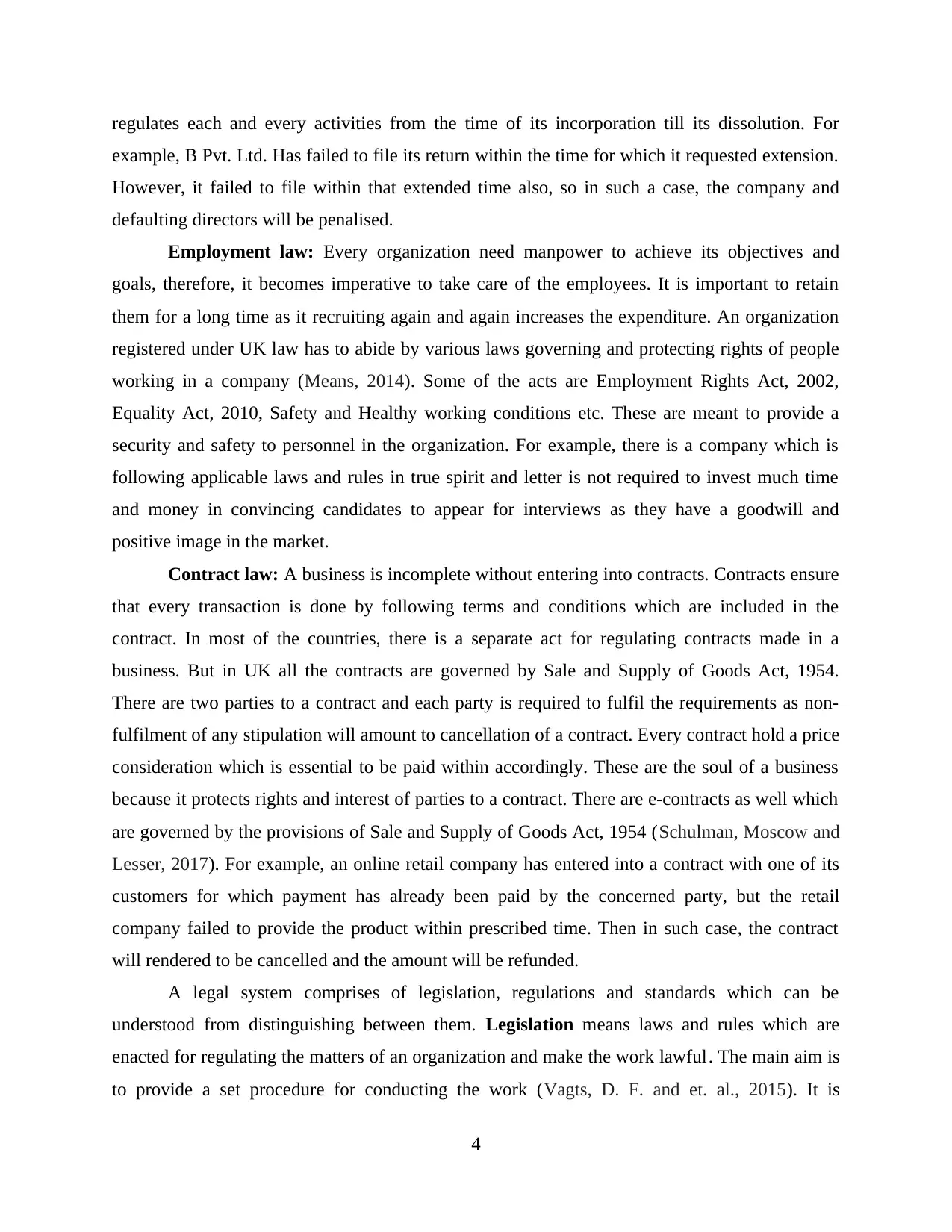
regulates each and every activities from the time of its incorporation till its dissolution. For
example, B Pvt. Ltd. Has failed to file its return within the time for which it requested extension.
However, it failed to file within that extended time also, so in such a case, the company and
defaulting directors will be penalised.
Employment law: Every organization need manpower to achieve its objectives and
goals, therefore, it becomes imperative to take care of the employees. It is important to retain
them for a long time as it recruiting again and again increases the expenditure. An organization
registered under UK law has to abide by various laws governing and protecting rights of people
working in a company (Means, 2014). Some of the acts are Employment Rights Act, 2002,
Equality Act, 2010, Safety and Healthy working conditions etc. These are meant to provide a
security and safety to personnel in the organization. For example, there is a company which is
following applicable laws and rules in true spirit and letter is not required to invest much time
and money in convincing candidates to appear for interviews as they have a goodwill and
positive image in the market.
Contract law: A business is incomplete without entering into contracts. Contracts ensure
that every transaction is done by following terms and conditions which are included in the
contract. In most of the countries, there is a separate act for regulating contracts made in a
business. But in UK all the contracts are governed by Sale and Supply of Goods Act, 1954.
There are two parties to a contract and each party is required to fulfil the requirements as non-
fulfilment of any stipulation will amount to cancellation of a contract. Every contract hold a price
consideration which is essential to be paid within accordingly. These are the soul of a business
because it protects rights and interest of parties to a contract. There are e-contracts as well which
are governed by the provisions of Sale and Supply of Goods Act, 1954 (Schulman, Moscow and
Lesser, 2017). For example, an online retail company has entered into a contract with one of its
customers for which payment has already been paid by the concerned party, but the retail
company failed to provide the product within prescribed time. Then in such case, the contract
will rendered to be cancelled and the amount will be refunded.
A legal system comprises of legislation, regulations and standards which can be
understood from distinguishing between them. Legislation means laws and rules which are
enacted for regulating the matters of an organization and make the work lawful. The main aim is
to provide a set procedure for conducting the work (Vagts, D. F. and et. al., 2015). It is
4
example, B Pvt. Ltd. Has failed to file its return within the time for which it requested extension.
However, it failed to file within that extended time also, so in such a case, the company and
defaulting directors will be penalised.
Employment law: Every organization need manpower to achieve its objectives and
goals, therefore, it becomes imperative to take care of the employees. It is important to retain
them for a long time as it recruiting again and again increases the expenditure. An organization
registered under UK law has to abide by various laws governing and protecting rights of people
working in a company (Means, 2014). Some of the acts are Employment Rights Act, 2002,
Equality Act, 2010, Safety and Healthy working conditions etc. These are meant to provide a
security and safety to personnel in the organization. For example, there is a company which is
following applicable laws and rules in true spirit and letter is not required to invest much time
and money in convincing candidates to appear for interviews as they have a goodwill and
positive image in the market.
Contract law: A business is incomplete without entering into contracts. Contracts ensure
that every transaction is done by following terms and conditions which are included in the
contract. In most of the countries, there is a separate act for regulating contracts made in a
business. But in UK all the contracts are governed by Sale and Supply of Goods Act, 1954.
There are two parties to a contract and each party is required to fulfil the requirements as non-
fulfilment of any stipulation will amount to cancellation of a contract. Every contract hold a price
consideration which is essential to be paid within accordingly. These are the soul of a business
because it protects rights and interest of parties to a contract. There are e-contracts as well which
are governed by the provisions of Sale and Supply of Goods Act, 1954 (Schulman, Moscow and
Lesser, 2017). For example, an online retail company has entered into a contract with one of its
customers for which payment has already been paid by the concerned party, but the retail
company failed to provide the product within prescribed time. Then in such case, the contract
will rendered to be cancelled and the amount will be refunded.
A legal system comprises of legislation, regulations and standards which can be
understood from distinguishing between them. Legislation means laws and rules which are
enacted for regulating the matters of an organization and make the work lawful. The main aim is
to provide a set procedure for conducting the work (Vagts, D. F. and et. al., 2015). It is
4
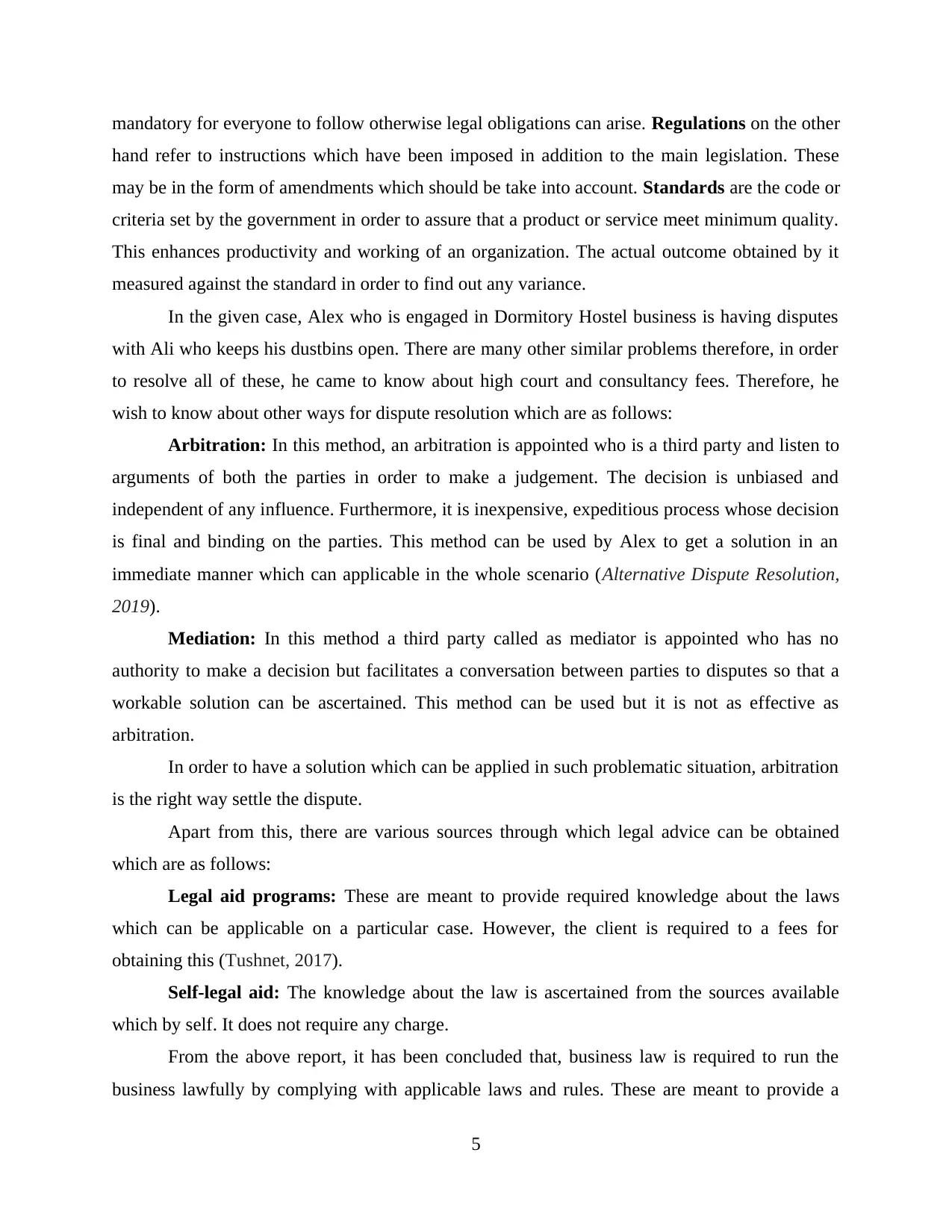
mandatory for everyone to follow otherwise legal obligations can arise. Regulations on the other
hand refer to instructions which have been imposed in addition to the main legislation. These
may be in the form of amendments which should be take into account. Standards are the code or
criteria set by the government in order to assure that a product or service meet minimum quality.
This enhances productivity and working of an organization. The actual outcome obtained by it
measured against the standard in order to find out any variance.
In the given case, Alex who is engaged in Dormitory Hostel business is having disputes
with Ali who keeps his dustbins open. There are many other similar problems therefore, in order
to resolve all of these, he came to know about high court and consultancy fees. Therefore, he
wish to know about other ways for dispute resolution which are as follows:
Arbitration: In this method, an arbitration is appointed who is a third party and listen to
arguments of both the parties in order to make a judgement. The decision is unbiased and
independent of any influence. Furthermore, it is inexpensive, expeditious process whose decision
is final and binding on the parties. This method can be used by Alex to get a solution in an
immediate manner which can applicable in the whole scenario (Alternative Dispute Resolution,
2019).
Mediation: In this method a third party called as mediator is appointed who has no
authority to make a decision but facilitates a conversation between parties to disputes so that a
workable solution can be ascertained. This method can be used but it is not as effective as
arbitration.
In order to have a solution which can be applied in such problematic situation, arbitration
is the right way settle the dispute.
Apart from this, there are various sources through which legal advice can be obtained
which are as follows:
Legal aid programs: These are meant to provide required knowledge about the laws
which can be applicable on a particular case. However, the client is required to a fees for
obtaining this (Tushnet, 2017).
Self-legal aid: The knowledge about the law is ascertained from the sources available
which by self. It does not require any charge.
From the above report, it has been concluded that, business law is required to run the
business lawfully by complying with applicable laws and rules. These are meant to provide a
5
hand refer to instructions which have been imposed in addition to the main legislation. These
may be in the form of amendments which should be take into account. Standards are the code or
criteria set by the government in order to assure that a product or service meet minimum quality.
This enhances productivity and working of an organization. The actual outcome obtained by it
measured against the standard in order to find out any variance.
In the given case, Alex who is engaged in Dormitory Hostel business is having disputes
with Ali who keeps his dustbins open. There are many other similar problems therefore, in order
to resolve all of these, he came to know about high court and consultancy fees. Therefore, he
wish to know about other ways for dispute resolution which are as follows:
Arbitration: In this method, an arbitration is appointed who is a third party and listen to
arguments of both the parties in order to make a judgement. The decision is unbiased and
independent of any influence. Furthermore, it is inexpensive, expeditious process whose decision
is final and binding on the parties. This method can be used by Alex to get a solution in an
immediate manner which can applicable in the whole scenario (Alternative Dispute Resolution,
2019).
Mediation: In this method a third party called as mediator is appointed who has no
authority to make a decision but facilitates a conversation between parties to disputes so that a
workable solution can be ascertained. This method can be used but it is not as effective as
arbitration.
In order to have a solution which can be applied in such problematic situation, arbitration
is the right way settle the dispute.
Apart from this, there are various sources through which legal advice can be obtained
which are as follows:
Legal aid programs: These are meant to provide required knowledge about the laws
which can be applicable on a particular case. However, the client is required to a fees for
obtaining this (Tushnet, 2017).
Self-legal aid: The knowledge about the law is ascertained from the sources available
which by self. It does not require any charge.
From the above report, it has been concluded that, business law is required to run the
business lawfully by complying with applicable laws and rules. These are meant to provide a
5
⊘ This is a preview!⊘
Do you want full access?
Subscribe today to unlock all pages.

Trusted by 1+ million students worldwide
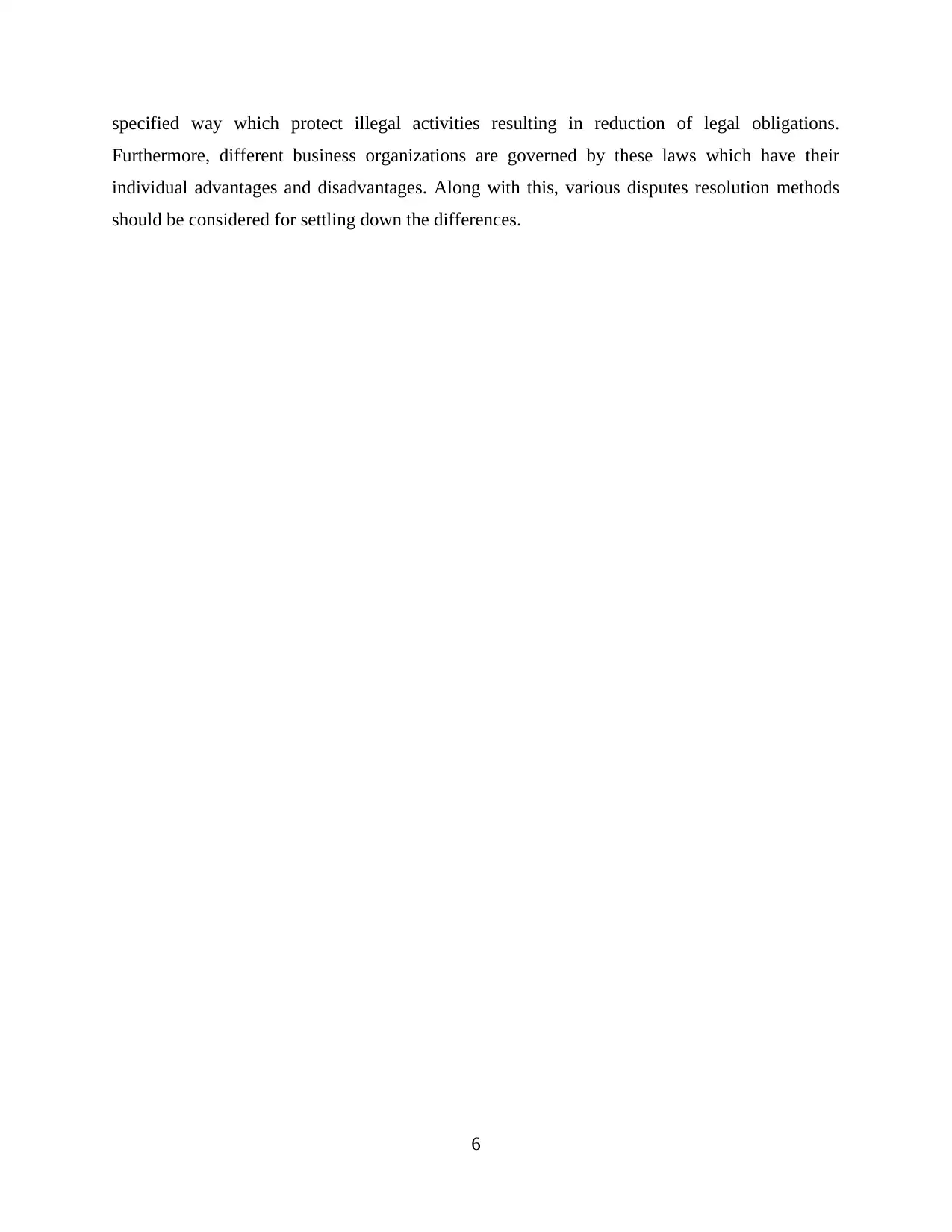
specified way which protect illegal activities resulting in reduction of legal obligations.
Furthermore, different business organizations are governed by these laws which have their
individual advantages and disadvantages. Along with this, various disputes resolution methods
should be considered for settling down the differences.
6
Furthermore, different business organizations are governed by these laws which have their
individual advantages and disadvantages. Along with this, various disputes resolution methods
should be considered for settling down the differences.
6
Paraphrase This Document
Need a fresh take? Get an instant paraphrase of this document with our AI Paraphraser
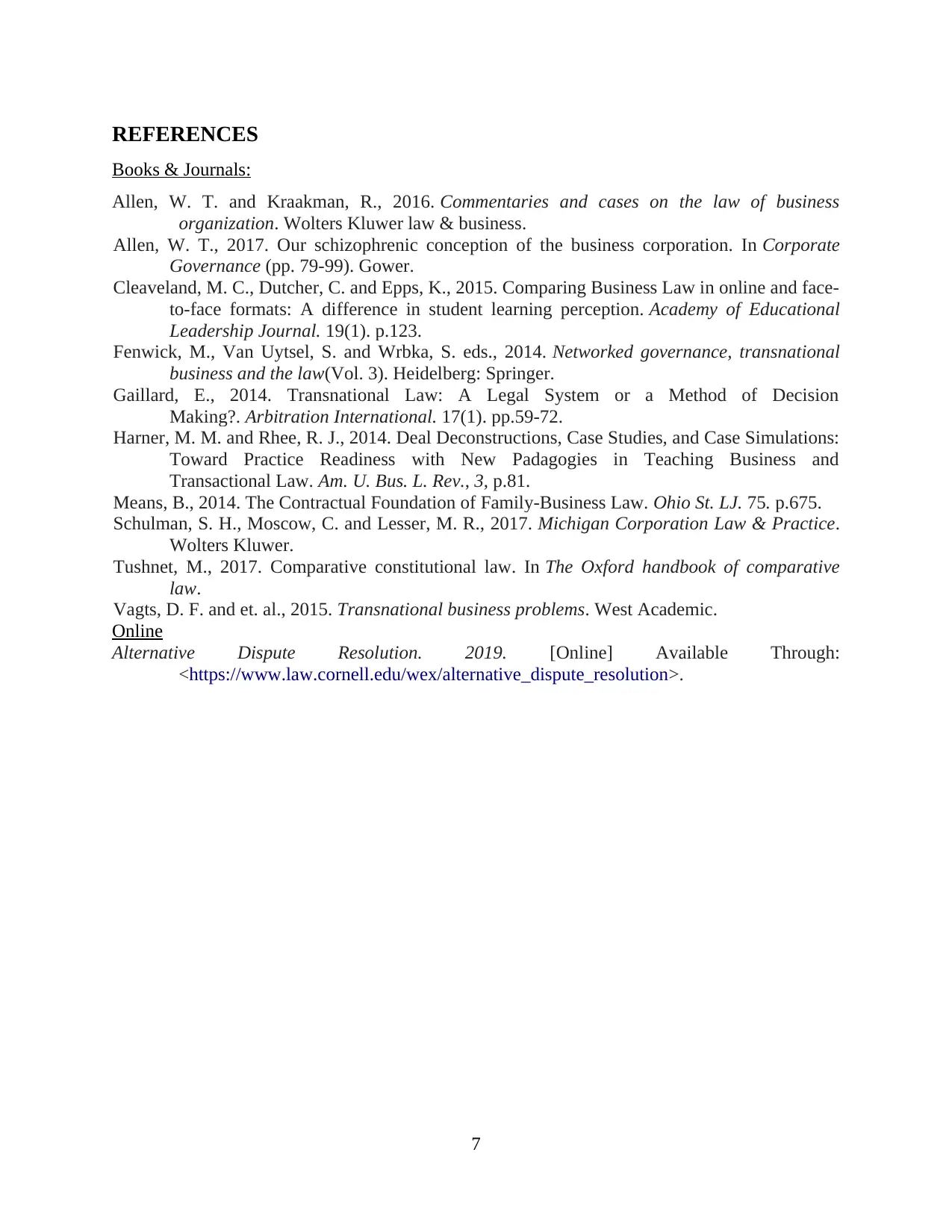
REFERENCES
Books & Journals:
Allen, W. T. and Kraakman, R., 2016. Commentaries and cases on the law of business
organization. Wolters Kluwer law & business.
Allen, W. T., 2017. Our schizophrenic conception of the business corporation. In Corporate
Governance (pp. 79-99). Gower.
Cleaveland, M. C., Dutcher, C. and Epps, K., 2015. Comparing Business Law in online and face-
to-face formats: A difference in student learning perception. Academy of Educational
Leadership Journal. 19(1). p.123.
Fenwick, M., Van Uytsel, S. and Wrbka, S. eds., 2014. Networked governance, transnational
business and the law(Vol. 3). Heidelberg: Springer.
Gaillard, E., 2014. Transnational Law: A Legal System or a Method of Decision
Making?. Arbitration International. 17(1). pp.59-72.
Harner, M. M. and Rhee, R. J., 2014. Deal Deconstructions, Case Studies, and Case Simulations:
Toward Practice Readiness with New Padagogies in Teaching Business and
Transactional Law. Am. U. Bus. L. Rev., 3, p.81.
Means, B., 2014. The Contractual Foundation of Family-Business Law. Ohio St. LJ. 75. p.675.
Schulman, S. H., Moscow, C. and Lesser, M. R., 2017. Michigan Corporation Law & Practice.
Wolters Kluwer.
Tushnet, M., 2017. Comparative constitutional law. In The Oxford handbook of comparative
law.
Vagts, D. F. and et. al., 2015. Transnational business problems. West Academic.
Online
Alternative Dispute Resolution. 2019. [Online] Available Through:
<https://www.law.cornell.edu/wex/alternative_dispute_resolution>.
7
Books & Journals:
Allen, W. T. and Kraakman, R., 2016. Commentaries and cases on the law of business
organization. Wolters Kluwer law & business.
Allen, W. T., 2017. Our schizophrenic conception of the business corporation. In Corporate
Governance (pp. 79-99). Gower.
Cleaveland, M. C., Dutcher, C. and Epps, K., 2015. Comparing Business Law in online and face-
to-face formats: A difference in student learning perception. Academy of Educational
Leadership Journal. 19(1). p.123.
Fenwick, M., Van Uytsel, S. and Wrbka, S. eds., 2014. Networked governance, transnational
business and the law(Vol. 3). Heidelberg: Springer.
Gaillard, E., 2014. Transnational Law: A Legal System or a Method of Decision
Making?. Arbitration International. 17(1). pp.59-72.
Harner, M. M. and Rhee, R. J., 2014. Deal Deconstructions, Case Studies, and Case Simulations:
Toward Practice Readiness with New Padagogies in Teaching Business and
Transactional Law. Am. U. Bus. L. Rev., 3, p.81.
Means, B., 2014. The Contractual Foundation of Family-Business Law. Ohio St. LJ. 75. p.675.
Schulman, S. H., Moscow, C. and Lesser, M. R., 2017. Michigan Corporation Law & Practice.
Wolters Kluwer.
Tushnet, M., 2017. Comparative constitutional law. In The Oxford handbook of comparative
law.
Vagts, D. F. and et. al., 2015. Transnational business problems. West Academic.
Online
Alternative Dispute Resolution. 2019. [Online] Available Through:
<https://www.law.cornell.edu/wex/alternative_dispute_resolution>.
7

8
⊘ This is a preview!⊘
Do you want full access?
Subscribe today to unlock all pages.

Trusted by 1+ million students worldwide
1 out of 9
Related Documents
Your All-in-One AI-Powered Toolkit for Academic Success.
+13062052269
info@desklib.com
Available 24*7 on WhatsApp / Email
![[object Object]](/_next/static/media/star-bottom.7253800d.svg)
Unlock your academic potential
Copyright © 2020–2026 A2Z Services. All Rights Reserved. Developed and managed by ZUCOL.





